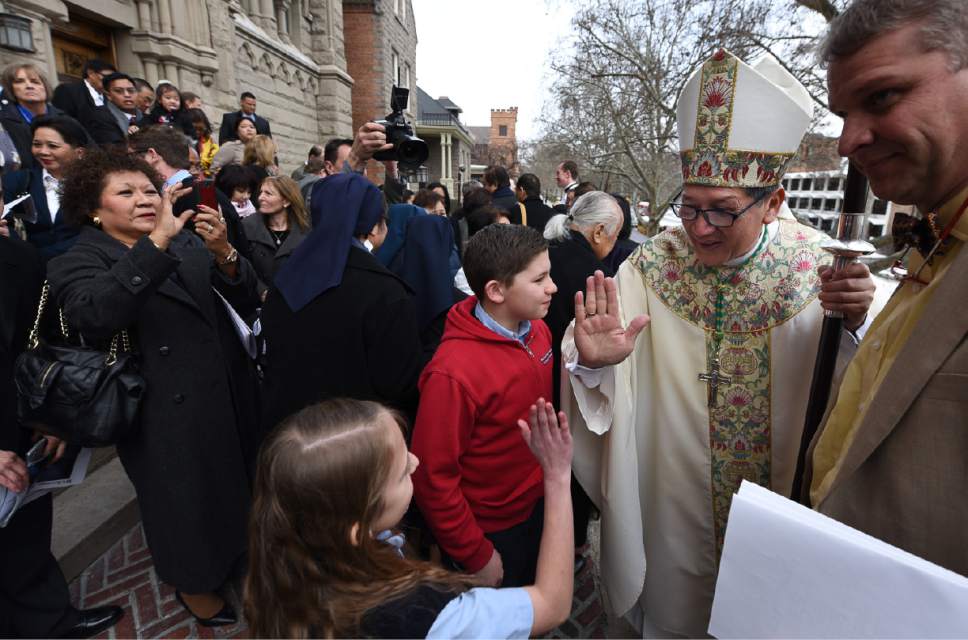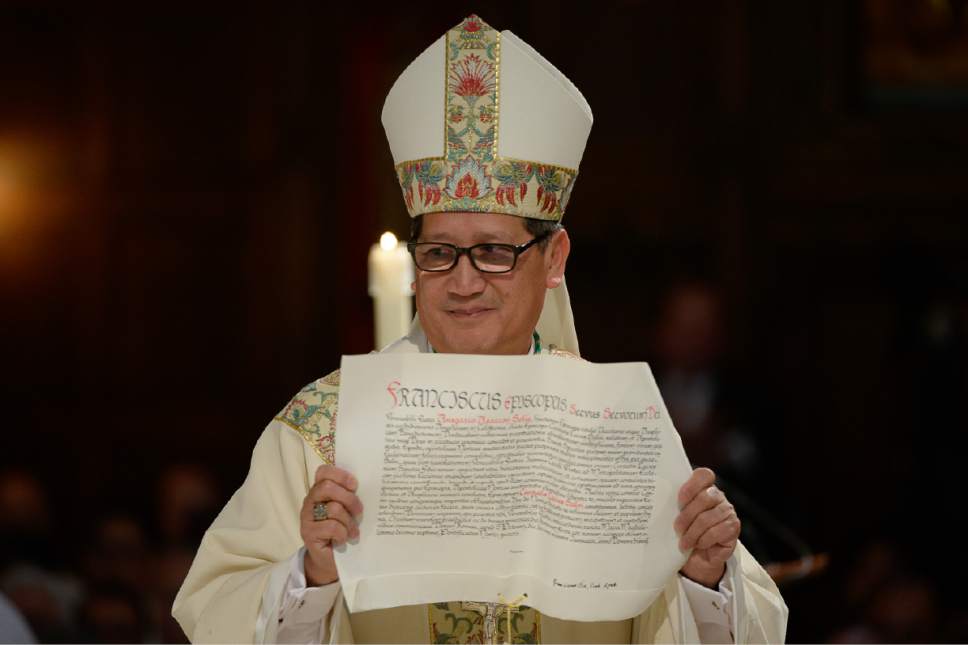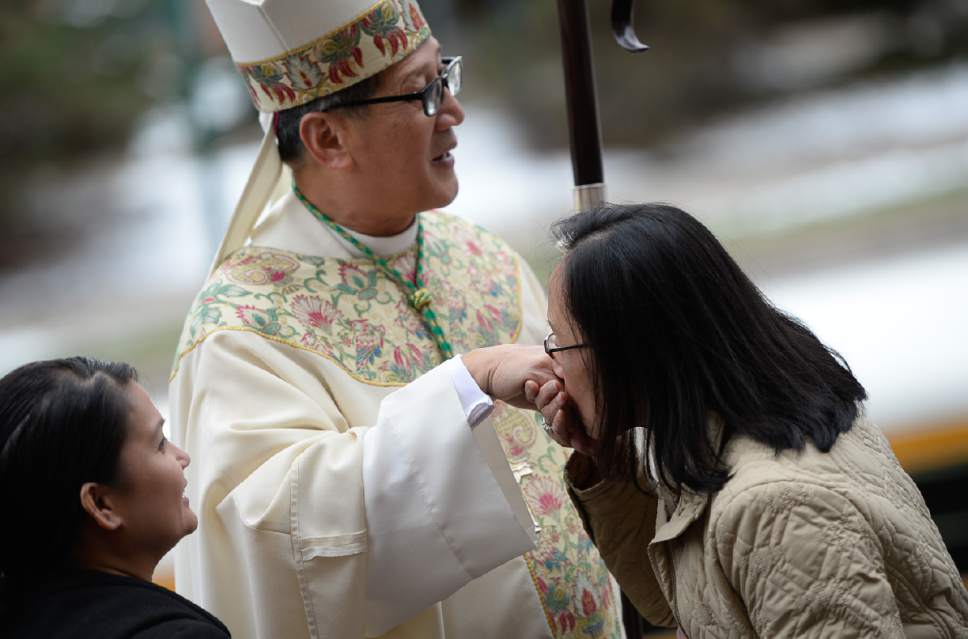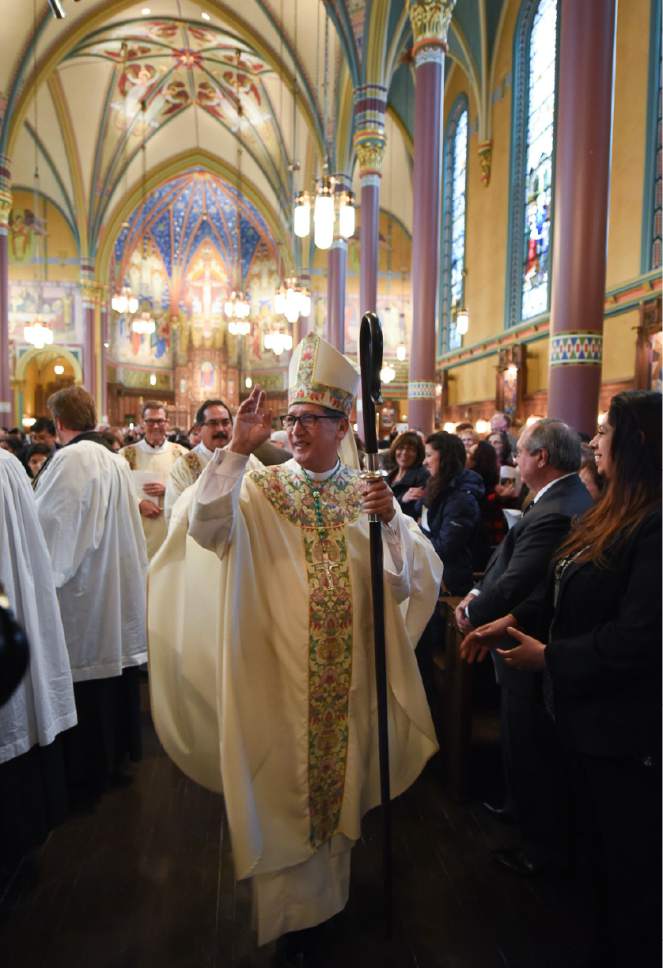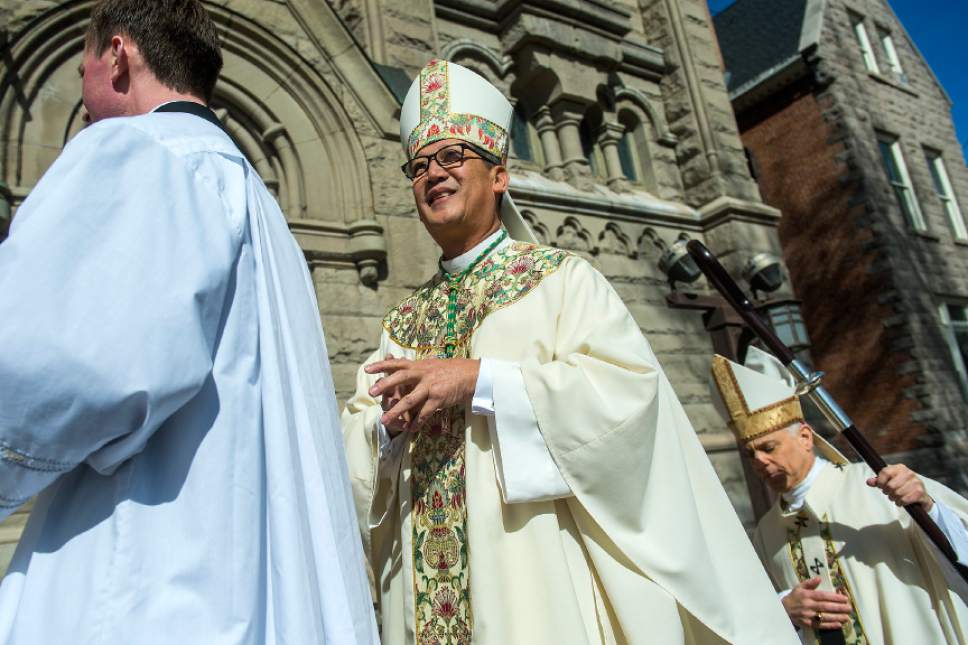This is an archived article that was published on sltrib.com in 2017, and information in the article may be outdated. It is provided only for personal research purposes and may not be reprinted.
Barely a month after Oscar A. Solis was installed as Salt Lake City's 10th Catholic bishop, the gregarious Filipino prelate issued an inaugural challenge to his flock: Get out of your comfort zone, learn your own religion, spread the good news of the Christian gospel and lift those in need.
In a rare move for such a newcomer, Solis circulated an official pastoral letter, spelling out his priorities for Utah's 300,000-plus Catholics.
As Mother Earth was awakening, Solis writes in his 2,400-word message, believers worldwide celebrated what they call Easter's miracle — the resurrection of Jesus Christ. "[It] brings about new beginnings, offering an opportunity to see and experience things with our minds and hearts renewed."
How will the Diocese of Salt Lake City "create that moment of Easter together?" Solis asks. "... I do not know, exactly, where this path will lead us."
But the charismatic cleric has some ideas, which he lays out in his debut ministerial missive, titled "A Springtime of the New Evangelization."
The letter, published April 14 in the Intermountain Catholic, provides a state-of-the-diocese report while offering a blueprint of Solis' goals.
"The spiritual rebirth of our faith and the renewed commitment," he notes, "will be our guiding star as I lead us along the path in carrying out our mission together."
In the piece, the former auxiliary bishop from Southern California speaks with confidence about what needs to be done, echoing Pope Francis' aims to turn Catholic parishes into "field hospitals always ready and open to receive sick people and bind their wounds, and where God's compassion and mercy [are] dispensed."
Solis calls for more priests, better religious education, greater commitment to social justice and charitable ministries, celebration of marriage between a man and a woman and the creation of healthy families, enhanced civil engagement between Catholics and with others, and a united push for the common good.
It won't be easy, Solis concedes.
"Society today mocks our efforts to uphold the dignity of life," he says. "We are opposed when we speak out against abortion; when we insist that the homeless, the poor, the sick, the incarcerated, and those who are addicted to harmful substances must be seen as people worthy of respect despite their circumstances; when we encourage our neighbors and our state and our nation to welcome the immigrant and the refugees."
The 63-year-old bishop — first Philippines-born one in the nation — reminds Utah Catholics that they are in this together.
"I cannot do it alone but need the cooperation of all," he writes. "A springtime of the New Evangelization in our diocese ... requires the involvement of the entire faith community to bring about that spiritual renewal among our priests, deacons, women and men religious, and the laity; in our parishes and schools, pastoral and social ministries, and other components of church life."
Few bishops would publish such a Catholic call to arms so soon after arriving in a diocese, Utah's Monsignor J. Terrence Fitzgerald says, but it is being well received by believers who went some 20 months without a permanent leader.
Solis is "tapping into the enthusiasm everyone feels about his appointment," Fitzgerald adds. "He's very popular. People are still coming out in large numbers to meet him."
The monsignor — an able administrator who has served a handful of previous Utah bishops and whom Solis calls "uncle" as a Filipino title of respect — applauds the "lovely letter."
"His underlying point is that too many Utah Catholics have only an elementary knowledge, or even ignorance of our faith," Fitzgerald explains. "He called for increased knowledge that will inspire us to be more active in every way."
That "uncle" continues to be pleased with Solis' leadership, style and direction.
As an auxiliary bishop in the Archdiocese of Los Angeles for more than a dozen years, overseeing ethnic ministries there and speaking several languages, Fitzgerald says, Salt Lake City's new bishop had "a lot of experience in a large, diverse church."
Utah's diocesan authorities had appealed to the pope to pick a man who might be committed to the Beehive State and not be moved to another diocese.
They are confident they got their wish.
Producing such a comprehensive and compassionate exploration and invitation, Fitzgerald says, "speaks of his commitment to the Catholic Church in Utah."
Key points from Bishop Solis' pastoral letter
Here are some of the priorities outlined in Utah Catholic Bishop Oscar A. Solis' pastoral letter, "A Springtime of the New Evangelization":
Faith formation
"It is necessary for every Catholic to learn more about the essential teachings of Christ and our church in order to gain a deeper understanding of what we believe."
The Holy Eucharist and Catholic identity
"We find our Catholic identity in the celebration of the Holy Mass and other sacraments. These are the channels of God's graces, the fountain of new life, nourishment, forgiveness and other spiritual gifts. Renewal calls for vibrant and uplifting Sunday liturgical celebrations and other forms of worship."
Vocations to the priesthood and religious life
"In our mission diocese, the harvest is great but the laborers are few. The scarcity of priests and religious is a serious concern. So, let us generate greater enthusiasm in promoting vocations to the priesthood and religious life in order to attend adequately to the spiritual needs of the people."
Social justice and culture of life
"Part of our mission is to become instruments of justice and peace by respecting the dignity of every person and promoting the common good. ... Christ instituted marriage as sacred, making the family a sanctuary of life, a domestic church where God resides, and the heart of a civilization of love. Today, a healthy family still forms the basis of a healthy society. Confused values and various moral ills adversely harm our families these days. We must teach and uphold the fundamental truth of marriage as a loving union between a man and a woman, and strengthen its spiritual bond through prayer. ... Justice sets the right relationship among people that allows us to see in others — in the poor, the unemployed, the addicts, the sick, the least in our society, the undocumented, and the refugees — the very face of Christ."


